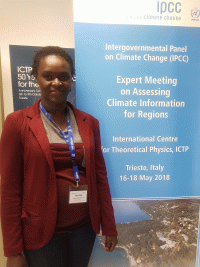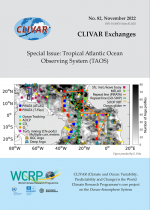Nana Ama Browne Klutse

Dr. Nana Ama Browne Klutse is a Senior Research Scientist at the Ghana Space Science and Technology Institute of the Ghana Atomic Energy Commission. She is the Manager of the Remote Sensing and Climate Center at the Institute.
She holds a PhD in Climatology from the University of Cape Town, South Africa. Her research focuses on climate modelling, climate impact assessments on society (health, energy, and gender). She has worked on both national and international projects and consultancies including the climate and health project in Ghana and the ongoing global CORDEX experiment. She is a Lead Author in Working Group 1 the Intergovermental Panel for Climate Change Sixth Assessment Report (2018 to 2021).
She has co-authored a good number of journal article publications and academic books to her credit. Her article published in Environmental Research Letters in May 2018 on Potential impact of 1.5 °C and 2 °C global warming on consecutive dry (CDD) and wet days (CWD) over West Africa revealed that enhanced warming results in a reduction in mean rainfall across the region, CDD will increase over the Guinea Coast, in tandem with a projected decrease in CWD at both 1.5 ◦C and 2◦C global warming. The article concludes that the difference in impacts between 1.5 °C and 2 °C warming on the projected changes imply that either we meet the threshold of 1.5 °C or 2 °C we are going to face similar seasonal impacts in consecutive dry and wet days over West Africa.
Courses she teaches include General Physics, Cloud Physics, Atmospheric Physics, Climate dynamics of Africa, Regional Climate modelling. She supervises students’ research in Ghana and abroad at Masters and PhD levels. She also serves as an external examiner for universities in Ghana.
She dedicates her life for community services, mentors young men and women for education pursuits, self-confidence and self-motivation. She also trains professionals in etiquettes and assertiveness. As part of her service to give back to society, she is a motivation speaker and articulates effectively on all platforms. At the leisure time, she spends time with children with learning disabilities.
A few of her publications are below. Follow her on researchgate https://www.researchgate.net/profile/Nana_Ama_Browne_Klutse
Twitter: @amabro23
Klutse, N.A.B., Ajayi, V., Gbobaniyi, E.O., Egbebiyi, T.S., Kouadio, K., Nkrumah, F., Quagraine, K.A., Olusegun, C., Diasso, U.J., Abiodun, B.J. and Lawal, K.A.A., 2018. Potential impact of 1.5° C and 2° C global warming on consecutive dry and wet days over West Africa. Environmental Research Letters
Aryee, J.N.A., Amekudzi, L.K., Quansah E., Klutse, N.A.B., Atiaha, W.A. and Yorke, C. 2017. Development of high spatial resolution rainfall data for Ghana, International Journal of Climatology. DOI: 10.1002/joc.5238
Quagraine, K.A., Klutse, N.A.B., Nkrumah, F., Adukpo, D.C., & Owusu, K. 2017. Changes in Rainfall Characteristics in Wenchi and Saltpond Farming Areas of Ghana. International Journal of Geosciences, 8(03), 305. https://doi.org/10.4236/ijg.2017.83015 DOI: 10.4236/ijg.2017.83015 ISSN Online: 2156-8367 ISSN Print: 2156-8359
Klutse, N.A.B.; Sylla, M.B.; Sarr, A.; Diallo, I.;, et al. 2016. Daily characteristics of West African monsoon rainfall in CORDEX regional climate models. Theoretical and Applied Climatology, 123: 369. https://doi.org/10.1007/s00704-014-1352-3
Klutse, N.A.B.; Abiodun, B.J.; Hewitson, B.C.; Gutowski, W.J.; Tadross, M.A. 2016. Evaluation of two GCMs in simulating rainfall variability over Southern Africa. Theoretical and Applied Climatology, 123: 415. https://doi.org/10.1007/s00704-014-1356-z
Gbobaniyi, E.; Sarr A.; Sylla, M.B.; Diallo, I.; Lennard, C.; Dosio, A.; Dhiédiou, A.;, Kamga, A.; Klutse, N.A.B.; Hewitson, B.; Nikulin, G.; Lamptey, B. 2014. Climatology, annual cycle and interannual variability of precipitation and temperature in CORDEX simulations over West Africa. International Journal of Climatology. 34: 2241–2257. DOI: 10.1002/joc.3834.













